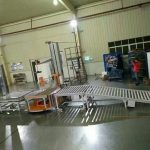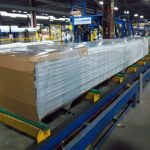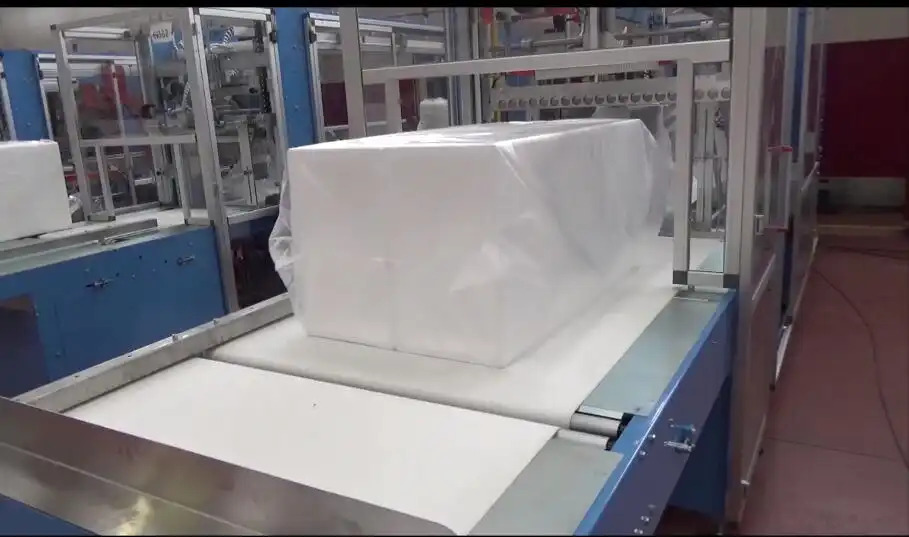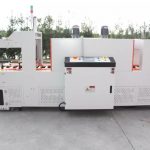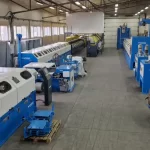The video shows the carpet roll packing automatically online with whole size sealed packaging.
Economic Benefits of Investing in Carpet Packing Machines
In today’s competitive market, efficiency and cost-effectiveness are vital for success. One significant innovation transforming the carpet industry is the carpet packing machine. This technology offers numerous economic benefits, making it an essential investment for businesses aiming to enhance productivity and profitability. In this article, we’ll explore the advantages of integrating carpet packing machines into your operations.
Introduction to Carpet Packing Machines
What is a Carpet Packing Machine?
A carpet packing machine is a specialized device designed to automate the process of rolling, wrapping, and packaging carpets. These machines ensure that carpets are securely packed, protecting them from damage during transit and storage. The automation of this process reduces manual labor and increases efficiency.
Importance in the Carpet Industry
Carpet packing machines play a crucial role in streamlining operations and ensuring high-quality packaging. As consumer demand for carpets grows, businesses must adopt efficient packing solutions to stay competitive. These machines help maintain product integrity and enhance customer satisfaction.
Key Economic Advantages
Boosting Operational Efficiency
Investing in a carpet packing machine can significantly boost operational efficiency. The automation of packing processes minimizes the need for manual intervention, allowing for faster and more consistent output. This efficiency enables businesses to meet high demand without compromising quality.
Cost Savings and ROI
One of the most compelling reasons to invest in carpet packing machines is the potential for cost savings. By reducing labor costs and minimizing material waste, companies can lower their operational expenses. Additionally, the initial investment often results in a substantial return on investment (ROI) over time as savings accumulate.
Reducing Product Damage
Proper packaging is essential for protecting carpets from damage. Carpet packing machines ensure secure and uniform packaging, reducing the risk of tears, stains, and other forms of damage during transit. This protection reduces the need for costly replacements and enhances customer satisfaction.
Technological Advancements
Integration of Smart Technology
Modern carpet packing machines are equipped with smart technology, such as IoT and AI, allowing for real-time monitoring and predictive maintenance. These features enhance operational efficiency by identifying potential issues before they lead to downtime, ensuring a smooth production process.
Customization and Flexibility
Advanced machines offer customization and flexibility, enabling businesses to adjust settings for various carpet sizes and types. This adaptability ensures optimal performance across a range of products, enhancing overall productivity and meeting diverse customer needs.
Environmental and Sustainability Benefits
Eco-Friendly Materials and Processes
Sustainability is a growing concern for consumers and businesses alike. Carpet packing machines that use eco-friendly materials and processes contribute to a reduction in environmental impact. By adopting sustainable practices, companies can improve their brand image and attract eco-conscious customers.
Energy Efficiency
Modern machines are designed to be energy-efficient, reducing power consumption and lowering operational costs. This efficiency not only benefits the environment but also leads to significant savings on utility bills, contributing to a healthier bottom line.
Challenges and Considerations
Initial Investment Costs
While the benefits are clear, the initial cost of purchasing and integrating carpet packing machines can be significant. However, businesses should consider the long-term savings and increased productivity when evaluating the investment. Financing options and potential ROI should be carefully analyzed.
Training and Workforce Development
Transitioning to automated systems requires a skilled workforce. Companies must invest in training programs to ensure employees can effectively operate and maintain the machines. This investment in human capital is crucial for maximizing the benefits of automation.
Integration with Existing Infrastructure
Integrating new technology with existing systems can be challenging. Businesses need a strategic approach to ensure compatibility and minimal disruption. This may involve upgrading current systems or adapting processes to fully leverage the capabilities of new machines.
Case Studies and Success Stories
Example 1: A Leading Carpet Manufacturer
A leading carpet manufacturer invested in carpet packing machines and saw a 30% increase in productivity within the first year. The automation reduced labor costs by 25% and decreased product damage by 15%, resulting in higher customer satisfaction and increased sales.
Example 2: A Small Business Transformation
A small carpet retailer adopted automated packing technology, allowing them to scale operations and compete with larger companies. The investment enabled them to offer faster delivery times and improved product quality, leading to a 40% growth in their customer base.
Future Trends and Innovations
Advancements in Machine Learning
The integration of machine learning in carpet packing machines is set to revolutionize the industry. These advancements will allow machines to learn from past data, improving precision and efficiency over time. This technology will enable businesses to stay ahead of market trends and consumer demands.
Increased Automation Across the Supply Chain
As automation continues to evolve, we can expect to see increased integration across the entire supply chain. This trend will lead to more cohesive and efficient operations, reducing lead times and enhancing product availability.
Conclusion
Investing in a carpet packing machine offers substantial economic benefits for businesses in the carpet industry. From boosting operational efficiency and reducing costs to enhancing sustainability and customer satisfaction, the advantages are clear. By embracing this innovative technology, companies can position themselves for success in an increasingly competitive market. Embracing automation not only addresses the demands of today but also prepares businesses for the challenges and opportunities of tomorrow.
